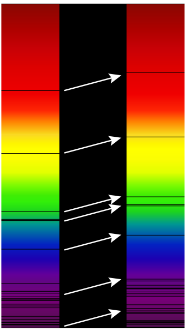Photo AI
Last Updated Sep 26, 2025
Redshift Simplified Revision Notes for GCSE Edexcel Physics
Revision notes with simplified explanations to understand Redshift quickly and effectively.
446+ students studying
Redshift
Red Shift occurs when light from distant galaxies appears to be stretched towards the red end of the visible spectrum. This effect is observed when galaxies are moving away from Earth.
The amount of redshift increases with the distance of the galaxy, which provides evidence that the universe is expanding.
This can be visualised using the analogy of a balloon:
- Imagine the start of the Big Bang as an uninflated balloon, with galaxies represented as dots on its surface.
- As the balloon (universe) inflates, the dots (galaxies) move further apart from each other.
- Similarly, as the universe expands, the distance between galaxies also increases.
- Light from a galaxy travelling through this expanding space gets stretched, resulting in a "red shift" — the wavelengths of light appear longer, shifting towards the red end of the spectrum.
- As the wavelength increases, the frequency of the light appears to decrease because each successive wave is emitted from a position further away from the observer.
This observation of red shift across distant galaxies supports the idea that the universe has been expanding since the Big Bang.
- Different elements absorb different frequencies (or wavelengths) of light.
- Each element produces a specific pattern of dark lines at the frequencies that it absorbs in the visible part of the EM spectrum.
- When we look at light from distant galaxies we see the same patterns but at slightly lower frequencies.
- There's an observed increase in the wavelengths of light coming from the galaxies & the patterns that have been shifted towards the red end of the spectrum.

- Measurements of redshift suggest that all galaxies are moving away from us quickly in every direction
- More distant galaxies have greater redshift, so the further away they are, the faster they are moving away from us.
500K+ Students Use These Powerful Tools to Master Redshift For their GCSE Exams.
Enhance your understanding with flashcards, quizzes, and exams—designed to help you grasp key concepts, reinforce learning, and master any topic with confidence!
20 flashcards
Flashcards on Redshift
Revise key concepts with interactive flashcards.
Try Physics Flashcards9 questions
Exam questions on Redshift
Boost your confidence with real exam questions.
Try Physics Questions3 exams created
Exam Builder on Redshift
Create custom exams across topics for better practice!
Try Physics exam builder78 papers
Past Papers on Redshift
Practice past papers to reinforce exam experience.
Try Physics Past PapersOther Revision Notes related to Redshift you should explore
Discover More Revision Notes Related to Redshift to Deepen Your Understanding and Improve Your Mastery
Load more notes